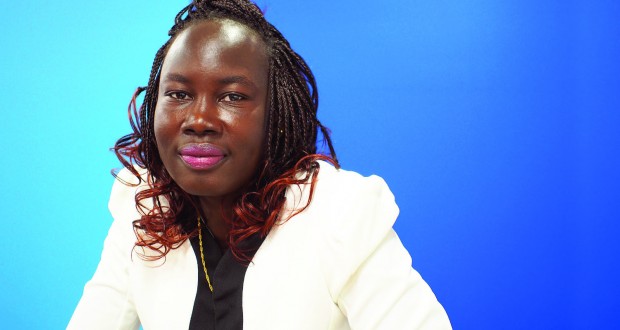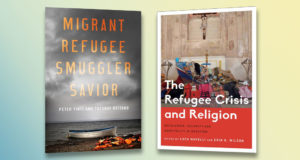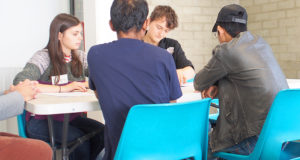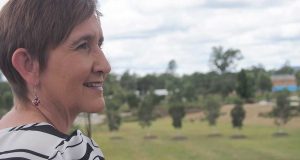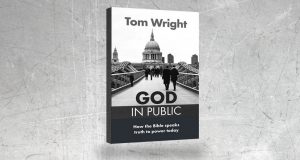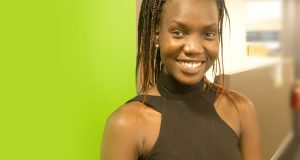Former South Sudanese refugee Maria (Nyaluit) Phalpang belongs to the Uniting Church Nuer faith community in Brisbane. She tells her story to Dianne Jensen.
Maria (Nyaluit) Phalpang has travelled a long way from her childhood home of Bentiu in Unity, a predominantly Christian state in war-torn South Sudan.
Faith, family and a passion for education have sustained her on the journey from this dangerous region bordering the Muslim Arab north to the huge Kakuma refugee camp in Kenya, and thence across the world to Australia.
Now 32, Maria lives in Banyo on Brisbane’s north. She belongs to the Uniting Church Nuer faith community which meets at St David’s Uniting Church, Coopers Plains and balances work as an interpreter and health researcher with the study load and final year placements for her nursing degree at the Australian Catholic University.
“We left because life was not safe; there was no school and people are fighting every day—there is no stability,” says Maria. “My father always wanted his children to go to school, so when there was this chance for coming to Kenya he sent me—I got a scholarship from a Catholic organisation that was sponsoring children to boarding school.”
Barely in her teens, Maria left Bentiu with two of her brothers in 1998, later joining their older brother Peter in the Kakuma refugee camp in Kenya. Peter was offered a UNHCR scholarship to an Australian university and after graduating as a biochemist was able to sponsor his three siblings to join him in 2007.
The fractured family was never fully reunited. Maria’s father died in 2009 and her mother fled to Nairobi after the resurgence in violence in South Sudan in 2013. Like many older refugees, she waits in the refugee camps housing the thousands of Africans escaping violence in countries such as the Democratic Republic of Congo (DRC), Burundi, Ethiopia, Sudan and Somalia.
“It is very hard for parents, because you recognise that your child could die in this dangerous place,” says Maria. “It is sad because you were born into a family and suddenly you are separated and it’s not a separation that you choose; it’s a situation that forces you to leave, or as a parent to send your children away.”
Maria’s mother will not join her children in Australia.
“My mother doesn’t want to come here; she says she can’t speak English,” says Maria. “No, it’s not good for old people to come; it’s good for young people. I understand.”
A faith to live by
The schism between generations is a common experience among young refugees in Australia. Many are caught between their desire to forge a new future and the struggle of their community to deal with the trauma of war and the ever-present anxiety for friends and family left behind.
Maria says that the faith community at St David’s plays an important role in supporting the Nuer diaspora in Brisbane.
“Church is actually like our family because this is where everybody comes on Sunday or other meetings. We have a lot of things that happen as a group and we do them as a church. People have been through a lot and they are surviving it because they have been together and they have faith,” says Maria.
“This is our backbone of faith because this is where we go to church and we pray and this is where we come together as one person and one community. This is where we advise each other on how to live—especially in this crisis—and this is where we get our parenting advice. Every time we go to church somebody says something about how we can take a good thing out of these bad things, and how lucky we are to be in Australia and we should embrace it and be happy about it and hope and pray a lot about things that are going wrong back home.”
Maria and her brothers, like many new Australians, continue to send money to support family overseas.
Violence leaves its mark
The outbreak of ethnic violence in 2013 and the ongoing conflict in Darfur and other regions have exacerbated tension between different Sudanese groups in Australia.
“There is a lot of mistrust,” says Maria. “We know anyone who is an Australian citizen is supposed to live as an Australian citizen but the fact is that you are born in that country, you still have ties to that country; you still have your relatives; your mother’s there. I would say 80 per cent of the thinking is back home, not here. If anything happens it actually connects to the people who live here.”
Alongside these historical rivalries, Maria says that violence within families is also impacting the fragile refugee community. Her job interpreting for the Department of Immigration and Citizenship and Centrelink brings her face-to-face with the reality of domestic violence.
“It is a big issue because the society where I come from is very male-dominated. When they come here, the woman now starts to have a voice and the husband says, ‘Now you are going out from the home, you don’t even listen to me’, and that creates a lot of problem between couples and married people.”
The issue highlights the difficulty that many older refugees experience in adapting to a different culture, as well as the pressures of everyday life.
“People are working so much and they have so many responsibilities and it seems to be getting harder and harder for families, certainly for the older men. They used to say, ‘Do this, do that’ to a woman, and the man comes from work and the woman takes his shoes off, and they are expecting that. There is not time for all that now as everyone is busy, and they wind up fighting all the time. I hear it all coming out and I feel sad because this shouldn’t be happening in Australia.”
Breaking down barriers
Maria is passionate about helping refugee women access the health services they need, and her work for the Improving Health Care Service Delivery Research program at the Mater Hospital in Brisbane focuses on breaking down the barriers to service delivery.
“The program is looking into the gap between the health system and refugees [because] these women are not visiting the doctors, they are not aware of so many chronic diseases. The hospital is trying to find out why they are not coming to the doctor—language barrier, cultural barrier or anything hidden.”
This is my home
As she looks forward to beginning her nursing career, Maria’s plans are focused on building a home and family in Australia.
“About two years ago I realised, you can grow old dreaming of going back to Sudan but it is not happening.
I am so proud to be South Sudanese and I will always help them and do anything I can, but I have decided to base my life here. A lot of people don’t want to hear me but I say it’s a fact and if we are here, we should decide to settle.
“My life is here now. I love it here and I like the freedom, the opportunity.”
 JourneyOnline
JourneyOnline
